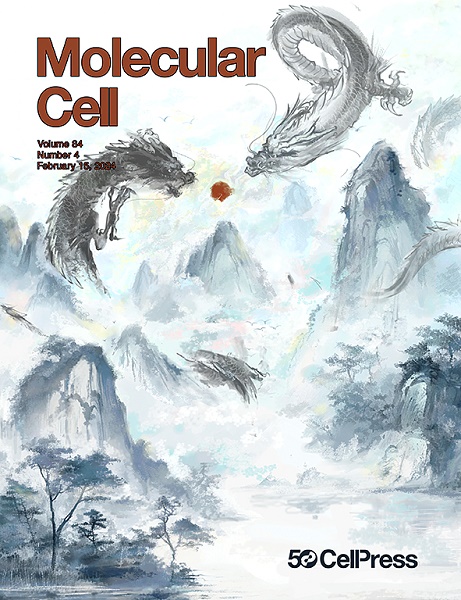SWI/ snf相关蛋白SMARCA3是一种组蛋白H3K23泛素连接酶,在癌症中调节H3K9me3
IF 14.5
1区 生物学
Q1 BIOCHEMISTRY & MOLECULAR BIOLOGY
引用次数: 0
摘要
组蛋白泛素化是调节染色质功能的关键翻译后修饰(PTM),然而许多组蛋白泛素化位点和控制它们的酶仍然知之甚少。在这里,我们发现SMARCA3是一种在结直肠癌(CRC)中经常下调的SWI/ snf相关蛋白,作为一种E3泛素连接酶,靶向赖氨酸23 (H3K23)的组蛋白H3。我们证明了SMARCA3组蛋白泛素化活性受到抑制的H3K9me3标记的刺激。SMARCA3的缺失降低了H3K23Ub和H3K9me3,增加了富集先驱转录因子基序的启动子和增强子的染色质可及性。这种染色质“重新布线”改变了转录格局,推动了促癌基因的上调。我们在CRC细胞系和患者来源的类器官中验证了这一机制,其中SMARCA3的缺失减少了H3K23Ub和H3K9me3。在异种移植小鼠模型中,过表达野生型SMARCA3,而非RING结构域突变体,抑制肿瘤生长。总之,我们的研究结果将SMARCA3定义为通过表观遗传机制参与结直肠癌发病的关键染色质调节因子。本文章由计算机程序翻译,如有差异,请以英文原文为准。

The SWI/SNF-related protein SMARCA3 is a histone H3K23 ubiquitin ligase that regulates H3K9me3 in cancer
Histone ubiquitination is a crucial post-translational modification (PTM) regulating chromatin function, yet many histone ubiquitination sites and the enzymes that control them remain poorly understood. Here, we identify SMARCA3, a SWI/SNF-related protein frequently downregulated in colorectal cancer (CRC), as an E3 ubiquitin ligase that targets histone H3 at lysine 23 (H3K23). We demonstrate that SMARCA3 histone ubiquitination activity is stimulated by the repressive H3K9me3 mark. Loss of SMARCA3 reduces both H3K23Ub and H3K9me3, increasing chromatin accessibility at promoters and enhancers enriched for pioneer transcription factor motifs. This chromatin “rewiring” alters the transcriptional landscape, driving upregulation of cancer-promoting genes. We validate this mechanism in CRC cell lines and patient-derived organoids, where SMARCA3 loss reduces H3K23Ub and H3K9me3. In xenograft mouse models, overexpression of wild-type SMARCA3, but not a RING domain mutant, suppresses tumor growth. Together, our findings define SMARCA3 as a key chromatin regulator contributing to CRC pathogenesis through epigenetic mechanisms.
求助全文
通过发布文献求助,成功后即可免费获取论文全文。
去求助
来源期刊

Molecular Cell
生物-生化与分子生物学
CiteScore
26.00
自引率
3.80%
发文量
389
审稿时长
1 months
期刊介绍:
Molecular Cell is a companion to Cell, the leading journal of biology and the highest-impact journal in the world. Launched in December 1997 and published monthly. Molecular Cell is dedicated to publishing cutting-edge research in molecular biology, focusing on fundamental cellular processes. The journal encompasses a wide range of topics, including DNA replication, recombination, and repair; Chromatin biology and genome organization; Transcription; RNA processing and decay; Non-coding RNA function; Translation; Protein folding, modification, and quality control; Signal transduction pathways; Cell cycle and checkpoints; Cell death; Autophagy; Metabolism.
 求助内容:
求助内容: 应助结果提醒方式:
应助结果提醒方式:


